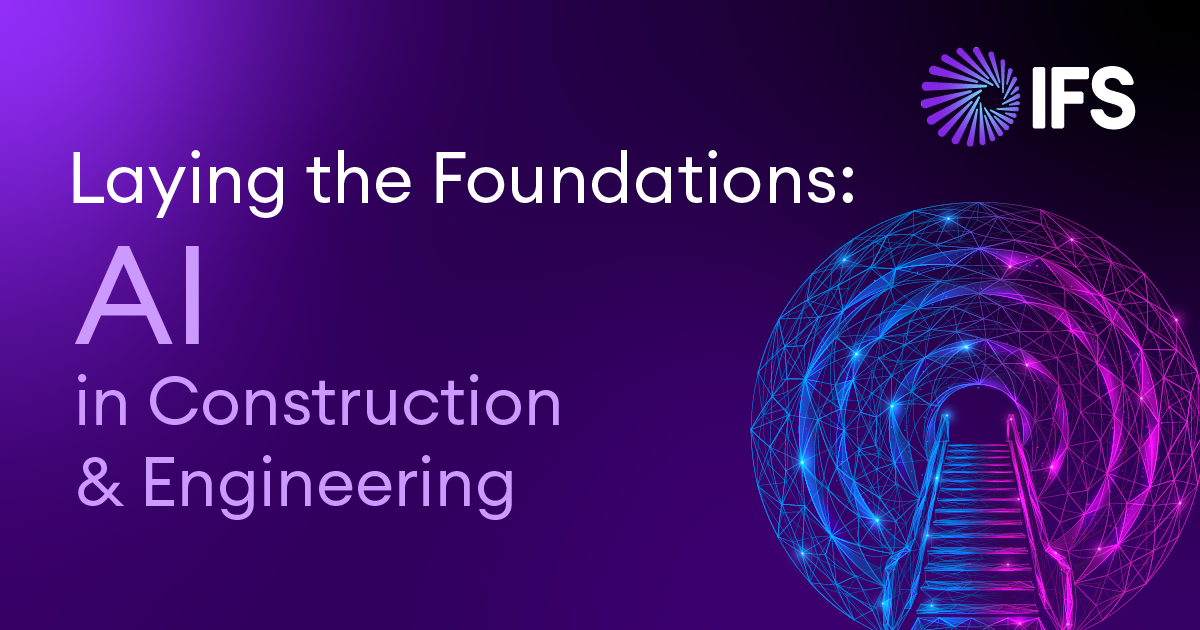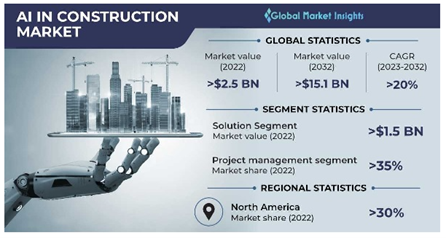What impact will Artificial Intelligence (AI) have on such a traditional industry as Construction and Engineering? Early indicators show the impact could potentially revolutionize the industry, making it smarter as well as more automated, efficient and sustainable.
In this blog article, we will discuss the current use of AI technology by construction and engineering companies and predict where this trend is headed. We will also explain why the industry should embrace this opportunity to bring about real change and overcome outdated methods and traditional challenges that can be addressed by adopting advanced technology like AI.
But before we do that, let’s address the question that’s on every executive’s mind: can AI solve our business needs and challenges today, or is it just hype? The answer is a resounding yes. Our industry can benefit from the improved performance and efficiency gains that adjacent industries have achieved thanks to AI adoption. Construction companies can also leverage AI to overcome some of their biggest challenges, such as safety concerns, environmental impact issues, skilled labor shortages, and project cost and delivery overruns.

Current AI Use Cases in Construction, Engineering, and Infrastructure
Before we delve into the current applications of AI, let’s first define what it is. Essentially, AI is a tool that mimics human cognitive functions such as pattern recognition, problem-solving, and learning. By enhancing our brain’s processing power, AI allows for more accurate predictions and better outcomes.
Machine learning, a crucial aspect of AI, analyzes data using statistical techniques to identify patterns and offer insights to help construction and engineering firms better assess risk and plan for success. An example of this in action is navigating around construction delays caused by inclement weather, which is a constant challenge in the industry.
The construction industry is currently seeing use of AI in the following areas.
- Optimization of design: Designers and consultants can create better designs based on data, environmental factors, materials, and costs.
- Equipment and resourcing optimization: AI can help with efficiency and utilization by analyzing data based on performance, maintenance, and scheduling.
- Sustainability: AI will enable the reduction of the environmental impact of construction projects by forecasting and minimizing carbon emissions, switching to greener materials and by avoiding any re-work required.
- Quality Control: AI can help with monitoring of progress and quality of a construction project using sensors, drones, and imaging analysis.
- Data analytics: This is the use of artificial intelligence to collect, process, and analyze large amounts of data from various sources, such as sensors, drones, cameras, documents and business systems such as ERP, to provide insights and predictions for construction projects, such as site conditions, project risks, forecast future project costs and margins and performance indicators.
- Wearable tech: These are devices that can be worn by workers to enhance their safety, productivity, and communication, such as smart helmets, glasses, vests, and gloves.
Enhanced project control and optimizing asset performance
Within the IFS Cloud solution, AI is already embedded in some key areas for the Construction and Engineering sector. Some specific areas of investment have resulted in new functionality that enhances the set-up of a project where there will be a complex mix of activities that require AI to optimize the sequencing of resources, e.g. people, material, equipment and sub-contractors. While AI-powered automation is also present within the project forecasting capability of the EAC (estimate at completion) workbench to increase the speed and accuracy of a forecast at any point in time.
Once an asset has been constructed, the subsequent phase involves servicing and maintaining it to guarantee that it functions according to design and operational expectations. IFS Cloud has embedded AI capabilities that can generate maintenance checklists, facilitating an AI-optimized plan that can be transformed into an AI-optimized schedule. The IFS Cloud platform expertly manages the intricacies of project plans, along with all the necessary tasks to construct various assets, whether it be a hospital, school, factory, bridge, road, or building.
No matter what asset is being constructed, using AI functionality, IFS Cloud automatically analyzes the data created to enable the asset owner or manager to optimize its performance in the future.
Gartner describes this as:
“Asset performance management (APM) encompasses the capabilities of data capture, integration, visualization and analytics tied together for the explicit purpose of improving the reliability and availability of physical assets. APM includes the concepts of condition monitoring, predictive forecasting, and reliability-centered maintenance (RCM)”
AI Building into the Future – Opportunities and Challenges.

The construction and engineering industry is rapidly evolving over the next few years in terms of marketing size and predicting growth at CAGR of 20% between 2023 and 2032.
AI and automation are promising technologies that can improve the construction industry and improve growth. However, there are some persistent challenges in terms of their adoption:
- Traditional Resistance: Some construction stakeholders may be reluctant or skeptical to adopt AI and automation, due to fear of the unknown, lack of trust, or preference for traditional methods.
- Security: AI and automation rely on data collection and processing, which may pose risks of data breaches, cyberattacks, or privacy violations.
- Redundancy: AI and automation may replace some human workers or tasks, which may cause job losses, skill gaps, or social impacts.
- Regulation: AI and automation may require new or updated regulations, standards, or policies, to ensure safety, quality, and accountability.
- Data quality: AI and automation depend on the availability and quality of data, which may be limited, inconsistent, or inaccurate in the construction industry. To address this issue there is a need to simplify the overly complex business system landscape that most companies have by reducing the number of business systems and excessive use of Excel spreadsheets.
The construction industry is grappling with a long-standing challenge of a skills gap that impedes its capacity to embrace AI and automation. The Associated General Contractors of America (AGC) and Autodesk report reveals that a staggering 80% of construction firms face considerable difficulty in finding qualified workers for hourly craft positions. This results in increased expenses, project delays, and reduced productivity. However, leveraging technology and expertise can help bridge this gap by employing skilled experts to mentor and train the upcoming generation of industry professionals.
With IFS Cloud, you can leverage the power of AI and automation without worrying about the skills gap in the industry. IFS provides you with expert guidance and advice on how to use AI and automation technology to improve your construction and engineering projects. You can benefit from IFS’s tested IFS.ai applications and embedded innovations right from the start without having to hire expensive technical teams or conduct costly proof-of-concepts. IFS Cloud has a dedicated R&D team that explores and evaluates AI use cases and applications for each of our focus industries, saving you time and money.
Start embracing the power of AI
Given the prevalence of discussions surrounding AI in both industry and media, construction and engineering companies may wonder how to effectively incorporate these advances into their operations using IFS Cloud.
It is critical to partner with a reliable and knowledgeable source for AI implementation.
Fortunately, IFS.ai offers the expertise and solutions necessary to embark on your AI-powered journey with confidence. In an industry that is often hesitant to embrace change and invest in technology, integrating AI can provide a significant competitive advantage and attract top talent and clients to fuel future growth. Inaction is not an option, as competitors are sure to seize this opportunity.
To learn how IFS can help your business success, read our latest whitepaper on “Native Agility for Construction & Engineering” by visiting: https://www.ifs.com/assets/cloud/nativeagility.
You can also discover how IFS.ai can help drive the efficiency of your people, assets, and workflows, visit https://www.ifs.com/ifs-ai.
Want to join our team of construction and engineering industry customers, experts and thought leaders from around the world next year? Register now for IFS Unleashed 2024 and get ready to be inspired: https://www.ifs.com/about/events/ifs-unleashed-2024